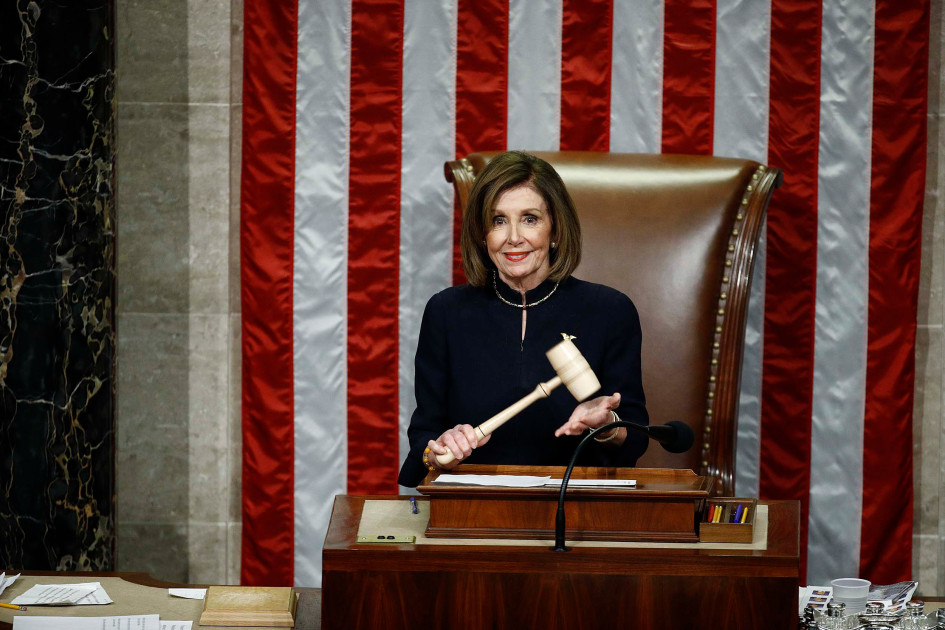For just the third time in American history, the U.S. House has impeached a president. In a Wednesday night vote, President Donald Trump was charged with abusing the power of his office for personal political gain. He also was charged with obstructing Congress during the impeachment inquiry into his alleged efforts to solicit re-election help from the president of Ukraine.
The Senate is expected to hold a trial in January to decide whether to acquit or to convict and remove Trump. But with 67 votes required there for conviction, and Senate Republicans holding 53 seats, Trump is expected to remain in office and run for another term.
To gain a deeper understanding of the issues in play and what’s to come, the Gazette asked Harvard faculty and affiliates in history, law, politics, government, psychology, and media to offer their thoughts on topics in their fields.
What have you learned from this impeachment episode so far, and how does it compare with the other two you’ve witnessed? Give us some context, please.
David Gergen, J.D. ’67
Former White House adviser to Presidents Richard Nixon, Gerald Ford, Ronald Reagan, and Bill Clinton
Public Service Professor of Public Leadership, Harvard Kennedy School
Much has already been said about the most obvious differences between the impeachment proceedings against Presidents Nixon and Clinton and those against President Trump. In both of the earlier cases, the incumbent president was far more responsive to Congress than now. Nixon sent up documents and witnesses to congressional investigators. Of course, he initially refused to give over the [White House audio] tapes, but when ordered by the Supreme Court to fork them over, he complied.
From the start, Clinton was fully cooperative when investigated by a special counsel’s office, headed up by Ken Starr. By contrast, Trump has been defiant and combative throughout, refusing to turn over any documents and blocking testimony by key aides who had firsthand knowledge of events at the center of the probe.
But there are other differences that have received little attention and are more foreboding. Nixon and Clinton were both contrite, and after their investigations ended, an onlooker had a distinct sense that our system of checks and balances had worked and that Congress had retained its oversight powers.
Based on the scorching letter that Trump just sent to Speaker Nancy Pelosi, it is clear that Trump is emerging from his impeachment more embittered than ever. Similarly, the way that he and aide Rudy Giuliani are thumbing their noses at the establishment, searching again in Ukraine for dirt against the Bidens, strongly suggests he will also emerge from this process feeling fully vindicated. An embittered, emboldened Trump will not only be a continuing threat to checks and balances as well as congressional oversight — he could become even more erratic and more destructive of our democratic norms.
A large portion of the country sees the president’s impeachment as wholly justified by the facts. Another portion sees it as a politically motivated attack on him. What are your thoughts on this moment, what it says about who we are as Americans, and what this means for the country?
Steven Pinker, Ph.D. ’79
Johnstone Family Professor of Psychology, Harvard University
It’s not just this moment. In an earlier moment in America, Benjamin Franklin observed, “So convenient a thing is it to be a rational creature, since it enables us to find or make a reason for everything one has a mind to.” Humans have always fallen into tribes based on creed and rationalized any incoming news to protect it.
This doesn’t mean both sides always have a point — the arguments for impeachment strike me as unimpeachable. (I know, I know, by my own reasoning I should question my own tribal commitments, and I do, but in this case we’re right and they’re wrong.) Still, polling data confirm that America truly is more polarized than in the preceding decades. The glib explanation is social media (blamed for everything), but the polarization preceded the rise of Twitter.
A more likely explanation is that the country has become increasingly segregated by education, occupation, and perhaps even temperament: Cosmopolitan elites congregate in cities and university towns, leaving those more receptive to nationalism and strong leaders in the exurbs, smaller towns, and countryside.
If the U.S. Senate acquits a president impeached for obstructing Congress by ignoring lawful subpoenas for testimony and documents, and directing others in the Executive branch to defy lawful subpoenas, is Congress permanently ceding its Article I powers under the Constitution?
Martha Minow
Morgan and Helen Chu Dean, Harvard Law School, 2009-2017
300th Anniversary University Professor, Harvard Law School
What does it mean when the Senate acquits a president who has been impeached for obstructing Congress? What does it mean for our Constitution when the Senate does nothing to curb a president who ignores lawful subpoenas and directs others to ignore subpoenas from Congress in the constitutional process designed to hold the president accountable? Is there a precedent set, ceding congressional duties to the president rather than providing a check and balance? Fundamentally, the Senate is a political body, and its members understandably pursue political ends. So, in the short term, such an action by the Senate simply expresses political views, preferences, and interests.
But, over a longer term, the electoral process allows the people to judge such action. Here, voters have the chance to assess whether senators have abided by the “Oath or Affirmation” required for each senator sitting on trial addressing the articles of impeachment. U.S. Constitution, Art. 1 Sec. 3. An oath is a solemn, spoken pledge to God or a supreme being, while an affirmation is a spoken pledge made on the signer’s personal honor with no reference to a higher power, and the voters will judge whether the senators abided by their oaths and affirmations and otherwise fulfilled their constitutional duties. We will know the constitutional meaning of the impeachment, the acquittal, and, indeed, the commitment to be a “government of law, not of men.” It is in the hands of each voter — and those charged with ensuring fair elections — to test and realize the commitment “that no one is above the law.”
During the Nixon presidential crisis, Bob Woodward and Carl Bernstein’s reporting in the Washington Post really did change minds among politicians and the public. While there’s been a lot of strong reporting done on this administration over the last three years, few minds have been changed about Trump. The public also seems to have lost interest in the impeachment as a news story. What does that say about the press, its effectiveness, and its future?
Nancy R. Gibbs
Former editor in chief, Time magazine
Lombard Director of the Shorenstein Center on Media, Politics and Public Policy, Harvard Kennedy School
There has been extraordinary reporting throughout this impeachment drama and throughout this presidency — different from Woodward and Bernstein, but nonetheless critical to the public understanding of the issues and the stakes. Some of it has been investigative, breaking news about the original whistleblower complaint and other internal administration dissent; some has been explanatory, laying out the constitutional guardrails and the history of U.S.-Ukraine relations. But it is nearly impossible to compare the information environments of these two periods.
The 1970s was still an age of gatekeepers, of newspapers and networks that could shape the national conversation because they controlled access to the public stage. The dramatic democratization of media since then has brought all kinds of benefits, but at a moment like this we are also weighing the costs. We are watching lawmakers talk past one another to distinct audiences who can’t hear each other; we’ve seen partisan identity, fueled by partisan media, become the defining division of our time, quite apart from differences over issues or ideology.
For more and more people, team red and team blue have become their church; the mainstream media is no longer gospel. So we should differentiate between media, which is arguably more powerful than ever, and the press, which still has a crucial civic obligation to fulfill and yet faces economic, political, and cultural challenges unlike any we’ve ever seen before.
Many presidents have made foreign policy decisions that others found politically disagreeable, even morally objectionable. Isn’t it a president’s prerogative to be able to follow his or her own personal moral compass while in office, even if those decisions break sharply with decades of U.S. policy?
Joseph S. Nye Jr., Ph.D. ’64
Author of “Do Morals Matter? Presidents and Foreign Policy from FDR to Trump” (2020)
Harvard University Distinguished Service Professor, Emeritus, Harvard Kennedy School
In the role of commander in chief, presidents have a lot of leeway in foreign policy, but it is not unlimited. As Edward Corwin once wrote, the Constitution creates “an invitation to struggle” for control of foreign policy. President Trump had the right to define the American national interest in Ukraine as corruption rather than defense against Russia, but when he withheld, without explanation, funds that Congress had appropriated for the latter cause, Congress had the right to investigate, and Trump did not have the right to obstruct Congress.
President Trump also had the right to ask President [Volodymyr] Zelensky for a favor, but not one for personal gain that involved foreign involvement in our elections (which the Founders warned against). Corruption is the abuse of public power for personal gain, and that high immorality was at issue when Trump invited Zelensky to announce an investigation of a principal likely opponent in the 2020 election.
Are we witnessing a chapter in the slow death of the American democratic experiment?
Daniel Ziblatt
Co-author of “How Democracies Die” (2018)
Eaton Professor of the Science of Government, Harvard University
The impeachment process has shown that President Trump’s instinct for the abuse of power is dangerous and reminiscent of autocrats’ in other places and times. But American democracy is not yet dying. Instead, it has been stricken by a debilitating disease that has made it increasingly frail since at least the 1990s: a polarizing illiberal right-wing radicalism. The system’s antibodies — the courts, journalists, and voters — are fighting back. And the election of 2020 may prove to be a miracle drug.
But at the end of the day, democracy’s fate hinges neither on impeachment nor on elections alone, but instead on whether the Republican Party responds over time by recommitting itself to the rule of law and basic democratic norms. We sometimes forget this simple fact: To survive, democracy requires at least two democratic political parties. We currently only have one. If this doesn’t change, our growing democratic disorder risks mutating into an even more extreme form.
In your book on impeached President Andrew Johnson, you wrote, “At the core of Johnson’s life is the story of class and race in America, how they shaped the country in ways familiar and unfamiliar. It is also a story of roads not taken, by him and by the country as a whole. … Through the benefit of hindsight, we are able to see the results, good and bad, of those decisions. They have made us who we are.” How does this case compare with Johnson’s impeachment? Is Trump, an impeached president of a divided nation, one who may very well be re-elected, one of the “results” of the Johnson acquittal?
Annette Gordon-Reed, J.D. ’84
Author of “Andrew Johnson” (2010)
Charles Warren Professor of American Legal History, Harvard Law School
Professor of History, Faculty of Arts and Sciences, Harvard University
The most obvious differences would be the times and manner in which Johnson became president. He took office in the immediate wake of the Civil War, after the assassination of Abraham Lincoln. There is no sense that Johnson had a super-devoted block of people in his corner, and he immediately began to alienate many in the victorious United States with his coddling of the defeated Confederates and opposition to bringing black Americans into citizenship.
Unlike today, the then-very-liberal Republican Party controlled the Congress and had a good chance of not only impeaching Johnson in the House but of having him convicted in the Senate. It didn’t work out that way — by one vote — but obviously that’s not where we are now, at least as far as we know at this moment.
I am always wary of drawing straight lines from events of long ago to something that is happening today. Too many things have happened in the interim that have shaped our present situation. There was nothing inevitable about arriving where we now find ourselves. So, no, I don’t see what is happening with the current president as a result of Johnson’s acquittal.
Presuming the Senate doesn’t convict Trump, who is helped and who is hurt in the 2020 election by this impeachment — and why?
Alice Stewart
CNN political analyst, former communications director for presidential campaigns of
Sen. Ted Cruz and Gov. Mike Huckabee
Institute of Politics Fall Fellow, 2019
There are no winners or losers in impeachments, there are simply political consequences and collateral damage. The saga of the Democrat impeachment of President Donald Trump has been three years in the making: starting on election night in 2016, with the final chapter being written on Election Day of 2020.
The impeachment in the Democrat-led House of Representatives was predicted, an acquittal in the Republican-led Senate is expected, and the consequences for the 2020 election remain to be seen. If history is any guide, I expect the impeachment quest to ultimately be beneficial to President Trump and conservatives, and damaging to Democrats who sought to subvert the outcome of the 2016 election. The real damage will be in swing districts, congressional districts won by President Trump in 2016 that are currently held by Democrats. Their vote for impeachment is almost a certain first step to being voted out of office.
I believe that the president’s July 25th call with the president of Ukraine was inappropriate, but impeachment is not the ideal remedy. There is no underlying crime, plain and simple. My position is not about some implied blind loyalty to President Trump. It’s about rejecting the effort to nullify the results of an election the Democrats have been unwilling to accept.
Like many issues in this current divided environment, impeachment has become a political Rorschach test. For those who dislike President Trump, everything is impeachable. If you support the president, everything is appropriate.
The question for 2020 is: What will Independent voters do? House Democrats have not circled the electoral wagons on impeachment. The numbers have not moved since they began the impeachment process. Polling data tracked on the FiveThirtyEight site shows Americans are evenly split on impeachment at 47 percent. A majority of Independents (56 percent) do not support impeachment.
If the economy remains strong, voters will vote based on their pocketbooks and not on impeachment and raw political politics. A vote on a strong economy will benefit conservatives who have been fighting for that economy and not liberals who have been fighting to unseat a president.
A New York Times story described Trump as toggling between resentment and self-pity, with a desire to attack his accusers and gain revenge over an impeachment process he sees as unfair. Given his emotional and psychological make-up, what are some of the short- and longer-term psychological effects the impeachment process may have on Trump?
Leonard L. Glass
Contributing author, “The Dangerous Case of Donald Trump” (2017)
Associate Professor of Psychiatry, Harvard Medical School
Mr. Trump, caught in the humiliating spotlight of impeachment, will react as he always does: Deny any responsibility for his predicament and seek to degrade and vilify his accusers.
His disparagement of the truth-tellers who testified before Congress reliably predicts his response to impeachment: claims of victimization and a thirst for revenge.
From a psychological perspective, Trump’s impeachment has played out with the inevitability of a Greek tragedy. Arising from character flaws that were clearly evident at his inauguration, his impeachment inexorably has traced that classic arc. He remains blind to his offenses, insisting he wrote a “perfect” letter and has been subjected to a witch hunt. That is Mr. Trump’s hallmark: externalizing all blame as though his inflated self-image would be irreparably punctured by any acknowledgment of his own imperfection.
In 2017, a number of us, mental health experts of varied disciplines, sounded an alarm in a public service book, “The Dangerous Case of Donald Trump” (St. Martin’s Press, Lee, B., ed., 2017). We identified a number of character flaws Mr. Trump had exhibited over the course of his prior life that marked him as unfit to hold that high office. Crucially, we noted his impulsivity, self-absorption, vengefulness, lack of empathy, inability to collaborate, and his thin-skinned grandiosity. We asserted that this toxic combination of traits would make it impossible for him to govern in a manner that was informed, reflective, and placed the country’s interests first.
While we were excoriated by some for commenting on the mental fitness of an individual whom we had not personally examined, we had two reasons for voicing our professional opinions: (1) Our assessment was of his fitness to serve, which conventionally does not require an interview when there is an abundance of data from other sources, including the subject’s own words; and (2) the magnitude of the risk to the public’s health and well-being. Nothing that has happened over the next three years has contradicted our findings.
What will happen when the reality of impeachment confronts this brittle, wounded, self-indulgent man? He will deny the unpleasant reality and, when the Senate fails to convict him, proclaim exoneration, much as he did after the Mueller Report. Incapable of self-restraint and respect for opponents, he will belittle and savage them. Wallowing in self-pity, he will make extravagant appeals to his true believers to purge the Congress of his critics. Lacking any appreciation for the irony of his posturing, he will amplify his insistence that he is the greatest president in history, learning nothing from this painful episode. Our country will endure the now familiar torrents of presidential outrage and vengeance until November’s election or, perhaps unluckily, four years beyond.
Why impeach President Trump right now?
Nancy Gertner
Retired U.S. District Court Judge
Senior Lecturer on Law, Harvard Law School
“Why so fast?” some are asking. “Why not wait until critical witness are subpoenaed and the president’s challenge to them winds through the courts?”
Here is why: The allegations here raise more than a question of an abuse of power — the power to withhold appropriated monies, even formal state visits — at the service of the president’s personal interest. It is an abuse of power for the purpose of interfering in an election — getting dirt on a political opponent. And it is an abuse of power that implicates national security — the security of an ally, the Ukraine, and our security as well.
But there is more, the brazenness of this president’s response when he is told there are no consequences to his misconduct. Recall that at the beginning of his administration the president was assured that there was no way to enforce the conflict of interest statute against him. To Trump, this means that it is OK for him to engage in such conflicts with impunity. When the Mueller report was issued adopting the Office of Legal Counsel position that a sitting president cannot be indicted, to Trump that was a green light. (In fact, the July 25 Ukraine call was literally the day after Robert Mueller testified before Congress.) He took the report’s conclusion that there was no evidence of a conspiracy with the Russians to interfere in the 2016 election (that met the high bar of the criminal law) to mean foreign interference in our election — inviting Ukrainian investigations into a political rival — was just fine. And with obstruction of justice, as well, no consequences means no problem. Mueller reported that the president engaged in multiple acts of obstruction, leaving the resolution of those charges to the political branches. The message to Trump: Keep it up.
If he could fire FBI Director James Comey with impunity, even when there was evidence that he did so to squelch the Michael Flynn investigation, why not Ambassador Marie Yovanovitch? Fire away, he concluded, based on his lawyer Rudy Giuliani’s view that the ambassador — a real corruption fighter — would not indulge the president and urge Ukraine to start the bogus Biden investigations.
Not being prosecuted for misconduct means it’s OK to do it. Today it is the Ukraine. Who knows what it would be tomorrow?
The Daily Gazette
Sign up for daily emails to get the latest Harvard news.
This content was originally published here.
EL 2 DE JUNIO DEL 2024 VOTA PARA MANTENER
TU LIBERTAD, LA DEMOCRACIA Y EL RESPETO A LA CONSTITUCIÓN.
VOTA POR XÓCHITL











